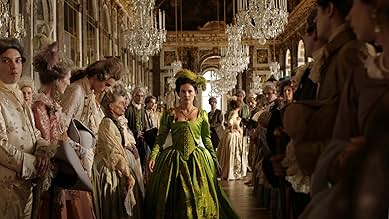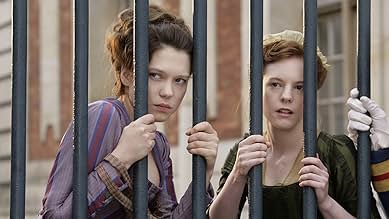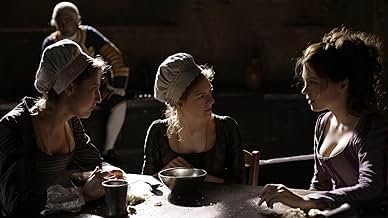Les adieux à la reine
- 2012
- Tous publics
- 1h 40min
NOTE IMDb
6,2/10
9,4 k
MA NOTE
Un regard sur la relation platonique entre Marie-Antoinette et l'une de ses lectrices pendant les premiers jours de la Révolution française.Un regard sur la relation platonique entre Marie-Antoinette et l'une de ses lectrices pendant les premiers jours de la Révolution française.Un regard sur la relation platonique entre Marie-Antoinette et l'une de ses lectrices pendant les premiers jours de la Révolution française.
- Réalisation
- Scénario
- Casting principal
- Récompenses
- 6 victoires et 12 nominations au total
Julie-Marie Parmentier
- La servante Honorine Aubert
- (as Julie-Marie Parmentier de la Comédie Française)
Marthe Guérin Caufman
- La domestique Alice
- (as Marthe Caufman)
Hervé Pierre
- L'abbé Hérissé
- (as Hervé Pierre de La Comédie Française)
Avis à la une
For the next few years, it must be assumed that any film featuring a popular uprising will attract lazy comparisons to the Arab Spring. The wild waters of revolution run swift in Benoit Jacquot's "Farewell, My Queen", set in the days of July, 1789. Over a wet week in France, starving Parisians storm the symbol of state tyranny, the Bastille, seizing guns and ammunition. Protesters issue a list of demands, calling for the beheadings of nearly 300 influential figures. The de facto signs of regime change are everywhere. Dead rats float in the Grand Canal in Versaille; mosquitoes terrorize the members of the Royal household. Marie Antoinette (Diane Kruger), the Queen of France, however, has escapism on her mind – she sits in bed, skim-reading the latest fashion pages.
In this task, she is aided by a number of ladies-in-waiting and her reader, Sidonie Laborde (Lea Seydoux). The young woman is called to run to the palace library and return with books and plays she reads aloud to the queen. We learn she is a member of the queen's inner circle and somewhat infatuated with her employer. She performs her duties with a mixture of fear, envy and respect. When the stench of revolution is impossible to ignore, she is told she will be guided to safety. Understandably, she feels more than a little betrayed when the queen orders her to impersonate a fleeing aristocrat, Gabrielle de Polignac, who will accompany her, dressed as a servant. If she is captured, Laborde risks death, while Polignac will abscond to safety.
This could all be familiar territory – Sofia Coppola's "Marie Antoinette" (2006) took a distinctly sweet-toothed approach to the French Revolution, imprisoning Kirsten Dunst behind tiers of artisan cakes. In Coppola's film, the French royals behaved like party-goers on an episode of MTV's "My Super Sweet 16". "Farewell, My Queen", which is based on a novel by Chantal Thomas, isn't confection of the same variety. This dimly lit and low budget film marks the end of the fantasy world of Versailles, its gilded halls, jeweled furniture and costumed courtiers. The Royal staff bow and curtsy at every available opportunity – in their spare time, they trade gossip about the private indiscretions of their employers and idly speculate the future of post-revolutionary France.
Unfortunately, the inner workings of the court of Versailles simply aren't any match for the layered politics that define teenage life on "My Super Sweet 16". While Coppola's film was candy floss masquerading as history, "Farewell, My Queen" succeeds in laboring every aspect of daily life at the Royal court. We are told, time and time again, there lurks intrigue behind every palace wall – most of it remains frustratingly off screen. At one point, I found myself thinking Laborde's chores were no different from the experiences of any gap year student – and considerably less hedonistic.
The end, when it arrives, is all too predictable. As members of the royal household are attacked on the streets of Paris, the occupants of Versaille decide to flee. As the royals leave for the last time, their carriages bursting with furniture and jewels, the staff is told "the King will now check the temperature of the throne room". Ice-cold, I would imagine. Not unlike Jacquot's French revolution.
In this task, she is aided by a number of ladies-in-waiting and her reader, Sidonie Laborde (Lea Seydoux). The young woman is called to run to the palace library and return with books and plays she reads aloud to the queen. We learn she is a member of the queen's inner circle and somewhat infatuated with her employer. She performs her duties with a mixture of fear, envy and respect. When the stench of revolution is impossible to ignore, she is told she will be guided to safety. Understandably, she feels more than a little betrayed when the queen orders her to impersonate a fleeing aristocrat, Gabrielle de Polignac, who will accompany her, dressed as a servant. If she is captured, Laborde risks death, while Polignac will abscond to safety.
This could all be familiar territory – Sofia Coppola's "Marie Antoinette" (2006) took a distinctly sweet-toothed approach to the French Revolution, imprisoning Kirsten Dunst behind tiers of artisan cakes. In Coppola's film, the French royals behaved like party-goers on an episode of MTV's "My Super Sweet 16". "Farewell, My Queen", which is based on a novel by Chantal Thomas, isn't confection of the same variety. This dimly lit and low budget film marks the end of the fantasy world of Versailles, its gilded halls, jeweled furniture and costumed courtiers. The Royal staff bow and curtsy at every available opportunity – in their spare time, they trade gossip about the private indiscretions of their employers and idly speculate the future of post-revolutionary France.
Unfortunately, the inner workings of the court of Versailles simply aren't any match for the layered politics that define teenage life on "My Super Sweet 16". While Coppola's film was candy floss masquerading as history, "Farewell, My Queen" succeeds in laboring every aspect of daily life at the Royal court. We are told, time and time again, there lurks intrigue behind every palace wall – most of it remains frustratingly off screen. At one point, I found myself thinking Laborde's chores were no different from the experiences of any gap year student – and considerably less hedonistic.
The end, when it arrives, is all too predictable. As members of the royal household are attacked on the streets of Paris, the occupants of Versaille decide to flee. As the royals leave for the last time, their carriages bursting with furniture and jewels, the staff is told "the King will now check the temperature of the throne room". Ice-cold, I would imagine. Not unlike Jacquot's French revolution.
A marvelous film. Very rarely does a film based on fact, especially a story as infamous as this one, succeed at creating such tension despite the fact that everyone knows pretty much what is going on and what will happen (United 93 springs to mind). As it is director Benoît Jacquot and his team have done a incredible job in capturing the confusion, uncertainty and pure dread that those living at Versailles in the final days of the Monarchy must have felt. Seriously, anyone who's ever dismissed period dramas and films based on true stories as "stuffy", slow and boring should give this one a shot. The cast is also exceptionally strong, led by a group of immensely talented female performers. The only downside is really the ending, unfortunately, slightly anticlimactic and a bit of a let down.
I must admit, when I went to see this film I thought: Not another picture about the revolution in France, I must have seen 20 already. I was pleased to find however that Benoit Jacquot has given the period a lot of thought, and has made one of the more effective costume films in recent years. His Sade of 2000 starred Daniel Auteuil and Isild le Besco, treating one of the lesser figures of the period with great insight into his character. Les adieux a la reine is no less engrossing; he takes us into the cramped corridors of the palace, where the small people live in dingy quarters and hope (usually fruitlessly) to be noticed by the royal couple. The night scene with the courtiers fearfully scanning the list of 286 notables who must have their heads chopped off, lit with a brackish yellow candle light is wonderfully effective.
The performances make the film. Diane Kruger, with her slight accent, makes a wonderful Marie Antoinette: sensing doom, yet still able to reach out to those around her. It's easy to see why Sidonie reveres her. Lea Seydoux, whom I hadn't noticed much up to now, shows much promise as an actress, scurrying around the palace trying to gather information about the riots in Paris. Her face is sometimes sullen, sometimes smiling, always interesting. Xavier Beauvois does well as the King. Finally Virginie Ledoyen as Yolande de Polignac--"the indisputably ravishing but dim-witted Yolande" as Simon Schama calls her. Ledoyen is as imperious and shallow as you could wish. You see how the Queen could lose her head (in both senses) over her.
The performances make the film. Diane Kruger, with her slight accent, makes a wonderful Marie Antoinette: sensing doom, yet still able to reach out to those around her. It's easy to see why Sidonie reveres her. Lea Seydoux, whom I hadn't noticed much up to now, shows much promise as an actress, scurrying around the palace trying to gather information about the riots in Paris. Her face is sometimes sullen, sometimes smiling, always interesting. Xavier Beauvois does well as the King. Finally Virginie Ledoyen as Yolande de Polignac--"the indisputably ravishing but dim-witted Yolande" as Simon Schama calls her. Ledoyen is as imperious and shallow as you could wish. You see how the Queen could lose her head (in both senses) over her.
It's July, 1789, and French citizenry is starting to revolt. Queen Marie Antoninette (Diane Kruger) is hold up at Château de Versailles with her court and her book reader (Léa Seydoux). When the news of the storming of the Bastille reaches them, panic sets in and the King's entourage start slipping away.
It's fascinating to see the various reaction as rumors start to spread. Léa Seydoux is great as the doe-eyed true believer. It is disconcerting to know her true naivety even though she has no idea. It's the source of the tension, but it's also infuriating. Diane Kruger is fine, but I thought that it wasn't quite big enough. However, the climax was just right.
It's fascinating to see the various reaction as rumors start to spread. Léa Seydoux is great as the doe-eyed true believer. It is disconcerting to know her true naivety even though she has no idea. It's the source of the tension, but it's also infuriating. Diane Kruger is fine, but I thought that it wasn't quite big enough. However, the climax was just right.
I love a good costume drama, but anything that includes Marie-Antoinette is apparently bound to be a repetition of the same old clichés over and over.
We get it, she was completely disconnected from reality, careless and pampered and bored and tended to for every bit a normal human being does itself. Age-old cliché that Marie-Antoinette was nothing more than a self-absorbed bimbo? Check.
We get it also, the French Revolution was an immense shock to the royalty and aristocracy; not only did they not see it coming, they didn't think it was possible at all to see the end of their reign. Again, the tried-and-true representation of 18th century French aristocrats as clueless morons? Check.
So, after reinstating the same backdrop again (and again), this version puts forth a bigger focus on rumours of a lesbian love affair the queen was accused of having back then, because that would make the movie so unique.. or not. The story was already a snorefest on paper so let's toss in some sexual material to spice it up in spite of one's better judgement? Check.
The list goes on.
The photo direction is beautiful, the costumes and decors are gorgeous, the actors are all excellent, all this movie is missing is an actual story worthy of your attention. A real shame.
We get it, she was completely disconnected from reality, careless and pampered and bored and tended to for every bit a normal human being does itself. Age-old cliché that Marie-Antoinette was nothing more than a self-absorbed bimbo? Check.
We get it also, the French Revolution was an immense shock to the royalty and aristocracy; not only did they not see it coming, they didn't think it was possible at all to see the end of their reign. Again, the tried-and-true representation of 18th century French aristocrats as clueless morons? Check.
So, after reinstating the same backdrop again (and again), this version puts forth a bigger focus on rumours of a lesbian love affair the queen was accused of having back then, because that would make the movie so unique.. or not. The story was already a snorefest on paper so let's toss in some sexual material to spice it up in spite of one's better judgement? Check.
The list goes on.
The photo direction is beautiful, the costumes and decors are gorgeous, the actors are all excellent, all this movie is missing is an actual story worthy of your attention. A real shame.
Le saviez-vous
- AnecdotesIn this movie, Diane Kruger speaks French with a German/Austrian accent - which is undoubtedly how the Austrian-born Marie Antoinette would have spoken herself.
- GaffesOn several occasions when soldiers are marching through the main and side gates of Versailles, and also when Sidonie goes to Le Petite Trianon for the first time and falls into a puddle, you can clearly see the very 21st century anti-terrorism concrete security barriers and bollards flanking the gates.
- Citations
Agathe-Sidonie Laborde: In a way, Your Majesty, you're asking me to go as bait.
La reine Marie Antoinette: An ugly word for a pretty mouth!
Agathe-Sidonie Laborde: Words are all I possess. I wield them well.
- ConnexionsReferenced in Parole de cinéaste: Benoît Jacquot (2017)
Meilleurs choix
Connectez-vous pour évaluer et suivre la liste de favoris afin de recevoir des recommandations personnalisées
- How long is Farewell, My Queen?Alimenté par Alexa
Détails
- Date de sortie
- Pays d’origine
- Sites officiels
- Langues
- Aussi connu sous le nom de
- Farewell, My Queen
- Lieux de tournage
- Sociétés de production
- Voir plus de crédits d'entreprise sur IMDbPro
Box-office
- Montant brut aux États-Unis et au Canada
- 1 597 998 $US
- Week-end de sortie aux États-Unis et au Canada
- 72 100 $US
- 15 juil. 2012
- Montant brut mondial
- 6 366 835 $US
- Durée1 heure 40 minutes
- Couleur
- Mixage
- Rapport de forme
- 2.35 : 1
Contribuer à cette page
Suggérer une modification ou ajouter du contenu manquant

Lacune principale
By what name was Les adieux à la reine (2012) officially released in India in English?
Répondre

































